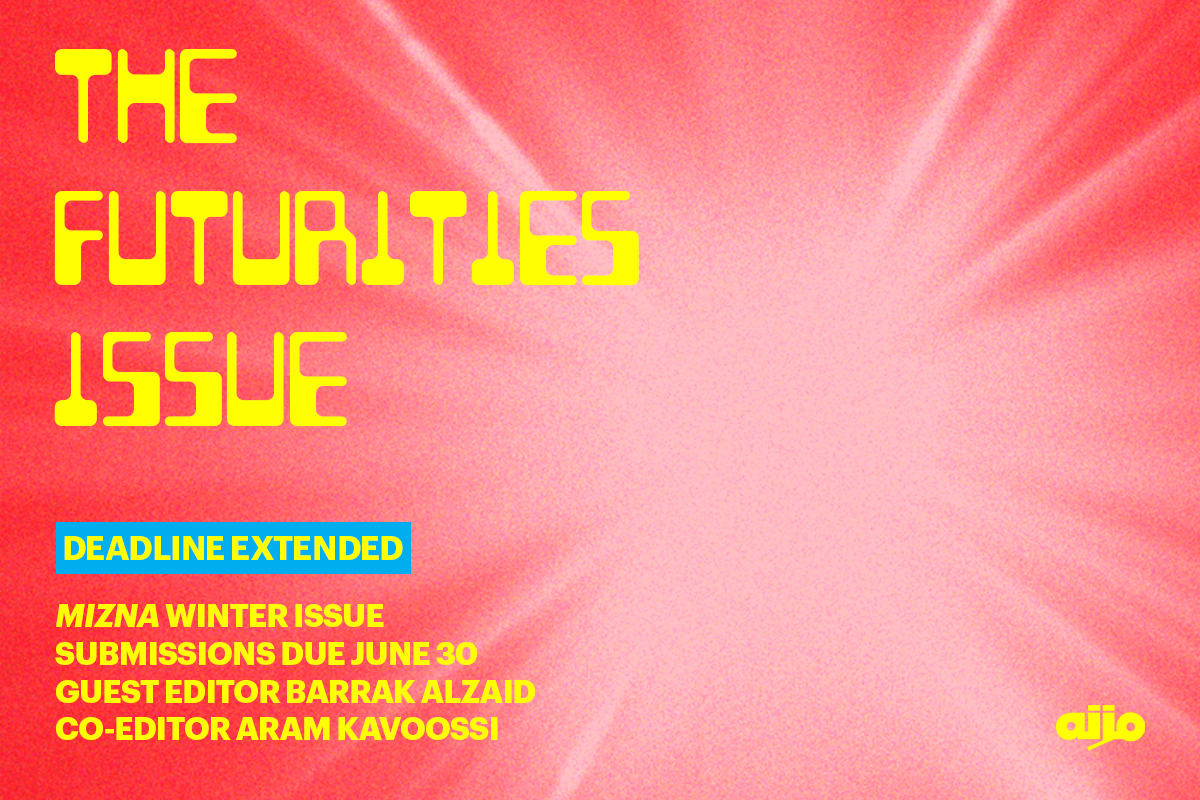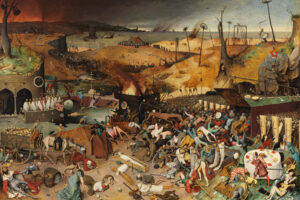
April 16, 2024
Call for Submissions: The Futurities Issue
Guest editor Barrak Alzaid
Co-editor Aram Kavoossi
Deadline extended: Submissions are open now through June 30, 2024
SUBMIT YOUR WORK HERE
PLEASE READ THE SUBMISSION GUIDELINES CAREFULLY, UNSOLICITED SUBMISSIONS SENT TO OUR EMAIL AND SUBMISSIONS THAT DO NOT ADHERE TO THE GUIDELINES WILL NOT BE CONSIDERED.
Before speculative writing, we must have speculative thought. Before thinking and feeling into the future, we must acknowledge our past and bear witness to our catastrophic present.
We write this call amid an ongoing genocide in Gaza—a genocide occurring before the world’s eyes, enabled by the world’s powers, a genocide that will yield generations of incommensurable grief and consequences, and, as of today, a genocide with no end in sight, a genocide that intends never to look back on its own crimes. Gaza is not alone in facing catastrophe—in Sudan, Armenia, Afghanistan, Morocco, Libya, Syria, Lebanon, and elsewhere throughout the region and the world, people are facing forced displacement, devastating violence, economic precarities, and uncertain futures. In approaching the subject of SWANA futurities, we face the very real question: In a moment when the present is so urgent, why bother discussing or imagining any future at all? Our short answer is: Because apathy is an intended effect of the forces who want to eradicate our Palestinian kin and exhaust our efforts of resistance and solidarity.
As we embark on this project, it is crucial to name that this genocide emerges from the future-oriented, settler-colonial project of Zionism; a project which exemplifies how notions of utopia and futurity can be instrumentalized to serve fascist and genocidal intentions. Our present moment manifests from long histories of extractive capitalism and colonial ambition that have come to shape the realities of the SWANA region and beyond, and constrain our abilities to imagine futures without these systems in place. To sow fear for the future and helplessness in the present is precisely the point; to colonize time and portray the desired outcomes of empire as inevitabilities is precisely the point. These tactics that work to manage and anticipate the expansion of colonial power have stoked the rise of genocidal futurities spanning Manifest Destiny, the Translatlantic Slave Trade, world-scale European colonialism and fascism, and the various trajectories of diaspora, migration, and forced displacement that converge in our staff, artists, and communities. This includes the stolen Dakota land on which we live and work in Minnesota and the endurance of systemic racism and police brutality in the United States. In this sense we know we are not alone in facing precarity, and that the stakes of this work are high.
The doomsday futurities that circulate throughout the SWANA region are not merely narratives; they alter the very fabric of how we move through time and space. In recent decades, the SWANA region has been dubbed the site of the “forever wars,” a barbaric desert locked in endless conflict, plagued by religious fundamentalism, and unable to “learn.” War itself demands a specific conceptualization of temporality, as urgency interrupts our relations to past and future, stretching the experience of the present into a looping, ruptured infinity. The region is also variegated in its projections and manifestations of futurity: oil-rich Gulf countries exploit migrant workers and decimate local ecosystems to consolidate wealth; governments brand themselves as progressive while curtailing populist movements. Elsewhere, Western military incursions and economic sanctions have likewise coopted SWANA futures and intensified present precarities in the name of “progress.”
We issue this call with faith in our ability to transform and imagine our futures, which are in fact undetermined, unsettled. In recent months, many have pointed to the joy and steadfastness of Palestinians amid incomparable catastrophe. In the words of Dr. Ghassan Abu Sitta, “Part of our resistance to the finality of genocide is for us to talk about tomorrow, plan for tomorrow, work on healing the wounds of our people. The aim of this war is that there would no Palestinian tomorrow. We own tomorrow. Tomorrow is a Palestinian day.”
The stakes of futurity
What dreams and tomorrows can we imagine that grapple with the urgencies of today? What forms of writing can intervene in the projections of unending trauma and destitution seemingly prescribed for the SWANA region and beyond—those narratives that compel us to assume a predetermined future? How can we, by writing imagined alternatives, reject the catastrophes we are condemned to and disrupt the systems of oppression that rely on deliverable forecasts of violence, dispossession, and immiseration?
This issue is inspired by the literary, aesthetic, and chronopolitical movement of Afrofuturism. We resonate deeply with Afrofuturism’s concern, as Kodwo Eshun writes regarding the role of the artist in combating the Global North’s predatory and demoralizing forecasts of African and Afrodiasporic futurities, “with the possibilities for intervention within the dimension of the predictive, the projected, the proleptic, the envisioned, the virtual, the anticipatory and the future conditional . . . a space within which the critical work of manufacturing tools capable of intervention within the current political dispensation may be undertaken.” We are equally engaged with Indigenous futurisms, queer futurities, anti-capitalist Gulf Futurism, ecofuturism, and beyond. Situating ourselves in a constellation of proleptic liberation movements, we welcome any and all contributions from authors engaging with these and related modes of thought. Through speculative writing, we aim to foster conversations that shed the chains of colonial futurities, while also remaining lucid, creative, and rigorously attendant to the action that must take place in the present in order for such futures to be realized.
We seek work that writes with the gravity of the fact that our present moment is the projected and sought future of the status quo. We seek work that takes seriously the need to intervene with agency and take action in the present if we ever wish to see a freer, alterable future.
Who we are and what we seek
Mizna is a SWANA-run and -focused literary journal, and the work you submit should speak to our audience and mission. We welcome all SWANA peoples and those in community with us who seek to contribute interventions, incitements, speculations, and agitations geared to shift currents in collective action, imagination, morale, history, and plausibility through literature.
- Writing of all forms: Poetry, prose, short stories, essays, creative nonfiction, visual poetry, comix, songs, spells, manifestos. Work that writes against form or incorporates multiple forms.
- Speculative works rooted in our world but not necessarily taking place in the world we know. We are open to science fiction, fantasy, horror, slipstream, magical realism, alternate history, utopia and dystopia, fairy tales, steampunk, cyberpunk, solarpunk, climate fiction, theory fiction, ecopoetics, and others related to this genre.
- More Octavia Butler, less Arthur C. Clarke.
- Works that look to the past for inspiration and can shift our thinking in the present. For example, reimaginings of SWANA folktales, myths, legends, and stories.
- Historical fiction with speculative elements inspired by explorations of settings and conditions for revolutionary movements. For example: the Arab Workers Movement (Mouvement des Travailleurs Arabes) and the Black Panthers’ refuge in Algeria in the early ’70s.
- Works that give voice to, and create a platform for, minoritized peoples in Western and SWANA contexts alike. Please be aware of your positionality when submitting this type of work.
- Works that challenge the notions of progress and linear time.
We are not looking for:
- Indulgences in escapism, uncritical technocapitalist sci-fi, utopian projects collaborating with empire, or the over-intellectualization of liberatory struggles.
- Academic writing or term papers. Your work can be complex and theoretical, but it should be clear and legible to a nonacademic audience. Easy on the jargon!
- Visual art submissions.
General Submissions Guidelines
Submitters do not need to be SWANA- or Arab-identifying, but work submitted should be mindful of Mizna’s aesthetic and the social realities of our audiences, as well as be a contribution to ongoing conversations in and beyond our communities. We encourage submitters to read back issues of Mizna before submitting work for consideration.
Mizna focuses on debut writing; please submit previously unpublished work. We do not accept visual art submissions. Simultaneous submissions are permissible, though we ask to be notified as soon as possible if the submission is accepted elsewhere. There are no submission fees. Selected contributors receive a $200 honorarium, a one-year subscription to Mizna, and five copies of the issue.
Please include a short cover letter (200 words or less) as the first page of your submission, with a brief overview of the work you are submitting and why you are submitting to Mizna. Include a note disclosing any simultaneously submitted works.
- Poets should list the poems they are submitting.
- Prose submissions should include a brief, 1–2 sentence overview of the submission (e.g., a synopsis if it is a story or narrative essay, or an overview of the argument for more expository essays). Keep in mind that we are a literary magazine.
- Include a brief (50 words or less) author bio.
- Add a maximum of one sentence for any additional information you would like the editorial team to know about the work.
- Include contact information: email, phone number, and mailing address.
Please submit as .doc or .docx files. Submitting pdfs is allowable only for pieces with complex layouts. We do not accept other file formats (e.g., .pages). Prose submissions should be double spaced and limited to 5000 words. Please do not send us your term papers or thesis manuscripts for consideration. Poetry submissions should be limited to four poems of any length. Verses exceeding our page width will be treated with a run-over indent.
Submissions that do not adhere to these guidelines will not be considered.
SUBMIT YOUR WORK HERE
Prompts from the guest editor
Need an idea for your submission? Guest editor Barrak Alzaid has supplied a series of prompts (for any genre) to inspire your writing.
1. What do we have to learn about tomorrow from the stories, songs and tales of yesterday? Take a parable, folktale, song or piece of lore rooted in ancestry. Begin to reimagine it by blending the past with the speculative future.
2. Today’s movements for tomorrow’s futures: We are living through a period of intense hope and abject violence, witnessing numerous calls for liberation at grassroots and global levels. Imagine one hopeful future we are nurturing today. How does this future reflect the dreams and aspirations of those currently fighting against oppression and catastrophe?
3. Alternate histories to shift the present: Look back at a moment in time, and reimagine it. How might changes then impact our present? Whether speaking to then or now, consider introducing alternative technologies, societal structures and modes of being.
4. How can we model living in reciprocity with the land? Describe the landscapes, the architecture, and the day-to-day lives of people in that distant or not-so distant future. How have they adapted to or mitigated the effects of climate change? What role does technology play in maintaining ecological balance and supporting community well-being?
5. Create a time capsule for tomorrow. Capture some aspect of our cataclysmic present, and describe it for future generations.
6. Start from the self, then write into your relationship to ancestry. Reflect on how the societal, the communal, and systemic aspects of what it means to be you have shaped identities, dreams, and daily realities around you.
7. Start from a place. Write from a natural or built environment, and make a plea for a future.
8. What are the hidden beats of butterfly wings, set in motion today, that will cascade? What futures can these butterfly effects make possible?

Barrak Alzaid is a writer of poetry, prose and creative nonfiction whose memoir, Fabulous, chronicles his queer coming of age in Kuwait. His current work in progress is a speculative climate fiction novel.
Excerpts of his memoir are anthologized in The Ordinary Chaos of Being Human, and New Moons. His poetry is forthcoming in the anthology El Ghourabaa: A queer and trans collection of oddities. He has been awarded fellowships and residencies through The Corporation of Yaddo, La Napoule Foundation and 100 West – Corsicana Artist & Writer Residency. His fiction and poetry have been awarded prizes by the Barjeel Art Foundation and Nasiona Magazine. He is a founding member of the artist collective GCC.












